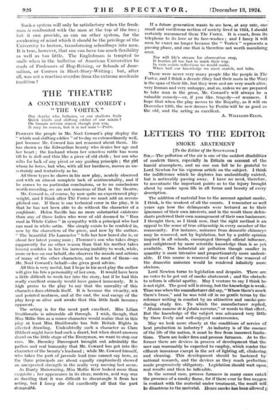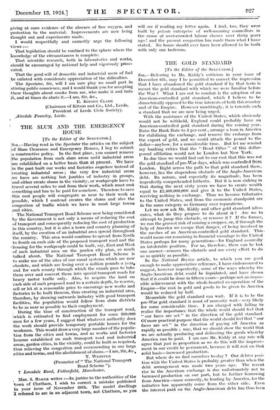LETTERS TO THE EDITOR SMOKE ABATEMENT [To the Editor of
the SPECTATOR.] Sire,—The pollution of the air is one of the saddest disabilities' of modem times, especially in Britain on account of the humid atmosphere, and no one can fail to be grateful to Lord Newton for his vigorous article on the subject. I think the indifference which he deplores has undoubtedly, existed,. but is noticeably passing away. I have no need, therefore,, to accentuate the important points as to the injury brought about by smoke upon life in all forms and beauty of every description.
The addition of material loss to the account against smoke, I think, is the weakest of all the counts. I remember so well years ago how the delinquents were lectured as to their ignorance of their own interests, and in the result these defen- dants preferred their own management of their own businesses. I thought then, as I think now, that the right method is an appeal to the sense of true citizenship in every member of the community. For instance, nuisance from domestic chimneys may be removed, not by legislation, but by a public opinion inspired in all schools, encouraged through official influence, and enlightened by more scientific knowledge than is as yet. available. The industrial air pollution though smaller in quantity is more intensive and proportionately more undesir- able. If this source is removed the need of the removal of, the domestic nuisance would be rendered infinitely more obvious.
Lord Newton turns to legislation and despairs. There are; no votes to be got out of smoke abatement ; and the obstacle, to reform is official apathy. May I venture to say I think he is not right. The good will is strong, but the knowledge is weak. I Time was when the manufacturer did say, " When there's muck, there's brass," and he was told off in no gentle terms by the, reformer writing in comfort by an attractive and smoke-pro- ducing study fire. To which the manufacturer replied,, " Mutato nomine de to Tabula narratur," or words to that effect., But the knowledge of the subject was advanced very little, by these lively and well-enjoyed controversies.
May we look more closely at the conditions of service of. heat production in industry? As industry is of the essence: of the life of the nation, it must be free from- incorrect limita- tions. There are boiler fires and process furnaces.. As to the ; former there are devices in process of development that the user can reasonably be expected to employ, which render the; effluent innoxious except in the act of lighting off, clinkering and cleaning. This development should be hastened by national research, and the devices as they reach perfection; made progressively obligatory. Legislation should wait upon' real results and then be inflexible.
In the second case, process furnaces in many cases entail) the presence of a smoky flame, for if there ever be free oxygen in contact with the material under treatment, the result will, be disastrous to the material. Ilene smoke has been allowed ;f
giving at once evidence of the absence of free oxygen, and protection to the material. Improvements arc now being thought out and experiments made.
I would respectfully and earnestly urge the following 'views :— That legislation should be confined to the sphere where the 'knowledge of the circumstances is complete.
That scientific research, both in laboratories and works, should be encouraged by national help and vigorously prose- cuted.
That the good will of domestic and industrial users of fuel Ibe enlisted with considerate appreciation of the difficulties. The Spectator, Sir, will I am sure play no small part in stirring public conscience, and I would thank you for accepting ,these thoughts about smoke from me, who make it and hate t, and at times do abate it.—I am, Sir, &c., E. KITSON CLARK (Chairman of Kitson and Co., Ltd., Leeds. President of Leeds Civic Society). Airedale Foundry, Leeds.



























































 Previous page
Previous page